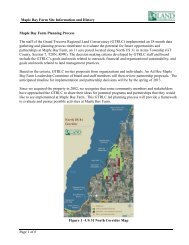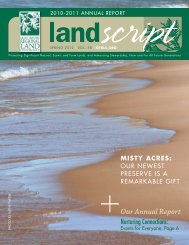2013_Spring - Grand Traverse Regional Land Conservancy
2013_Spring - Grand Traverse Regional Land Conservancy
2013_Spring - Grand Traverse Regional Land Conservancy
You also want an ePaper? Increase the reach of your titles
YUMPU automatically turns print PDFs into web optimized ePapers that Google loves.
Protecting More Farms<br />
Successful work with the Sends led to an unexpected<br />
land protection opportunity when Robert Amon,<br />
the out-of-state owner of Amon Farm, adjacent to<br />
Send Brothers Farm, approached the <strong>Conservancy</strong><br />
about protecting his land, which had been farmed<br />
by the Send brothers since the 1970s.<br />
Located in Whitewater Township, the Amon Farm wasn’t<br />
eligible for easements through the Acme Township’s<br />
Farmland Preservation Program, but Amon offered to sell<br />
his easement at 25 percent of its value if <strong>Grand</strong> <strong>Traverse</strong><br />
<strong>Regional</strong> <strong>Land</strong> <strong>Conservancy</strong> could find the funding.<br />
The <strong>Conservancy</strong>’s Brian Bourdages gained permission<br />
from the Michigan Department of Environmental Quality<br />
to use Clean Michigan Initiative grant funds to buy the<br />
easement, which, in turn, would protect the natural assets<br />
in the Petobego Creek watershed of <strong>Grand</strong> <strong>Traverse</strong> Bay.<br />
The Send brothers are now able to afford to<br />
buy the property from Amon, and it will be<br />
permanently designated for agricultural use.<br />
With support from <strong>Grand</strong> <strong>Traverse</strong> <strong>Regional</strong> <strong>Land</strong><br />
<strong>Conservancy</strong>, Acme Township’s Farmland Program has<br />
completed five easements to date, like those of the<br />
Send family, totaling 530 acres of protected farmland,<br />
with another 1,300 acres in the application process.<br />
As new farm properties are protected, local citizens<br />
will continue to enjoy the Send family’s fields of<br />
sunflowers, corn, wheat and rye in the heart of Acme’s<br />
farming and natural area—now, and in perpetuity.<br />
FarmAbility Moves into<br />
North US-31 Farming Corridor<br />
In order for any farmland preservation program to be<br />
successful, the farm community must see the benefits<br />
to their own farm operations and to the community as<br />
a whole.<br />
A new program being launched in <strong>2013</strong>, FarmAbility,<br />
aims to do just that: educate and inform farm families<br />
about preserving land for agriculture use in lieu<br />
of selling.<br />
With this program, designed by our colleagues at the<br />
Leelanau <strong>Conservancy</strong>, farm families in Whitewater,<br />
Milton, Elk Rapids, and Torch Lake townships will learn<br />
how to plan for their farmland to stay in their family or<br />
be permanently designated for active agricultural use<br />
by others.<br />
As the FarmAbility program educates more families<br />
about preserving the family farm and the benefits of<br />
agricultural preservation, the program will be more<br />
successful, according to Brian Bourdages, farmland<br />
protection manager with the <strong>Grand</strong> <strong>Traverse</strong> <strong>Regional</strong><br />
<strong>Land</strong> <strong>Conservancy</strong>.<br />
“Most landowners will not consider restrictions on their<br />
land, even for considerable compensation, without<br />
confidence that their actions will spur other farmers<br />
to do the same,” says Bourdages. “It’s crucial that<br />
farmland programs like the one in Acme Township have<br />
a critical mass of interested farm families.”<br />
With enough involvement, a long-term business<br />
environment for agriculture will stabilize and even grow,<br />
creating large blocks of protected land dedicated to<br />
agricultural use. FarmAbility will encourage families<br />
not only to continue farming, but also to make new<br />
investments in their operations. With funds for<br />
participants to work on succession planning, food<br />
safety, and environmental compliance through the<br />
state’s MAEAP (Michigan Agricultural Environmental<br />
Assurance Program) program, these new investments<br />
can happen in a manner that sustains our farmland,<br />
businesses, environment and water quality.<br />
And that’s a win for farmers and the environment.<br />
Our FarmAbility Program partners include:<br />
<strong>Grand</strong> <strong>Traverse</strong> Conservation District<br />
MSU NW Michigan Horticultural Research Station<br />
MSU Extension—Center for <strong>Regional</strong> Food Systems<br />
9<br />
GTRLC.ORG





